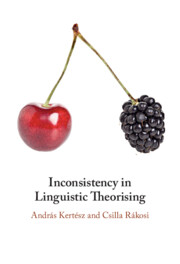Book contents
- Inconsistency in Linguistic Theorising
- Inconsistency in Linguistic Theorising
- Copyright page
- Dedication
- Contents
- Figures
- Tables
- Preface
- Abbreviations and central terms
- 1 Introduction
- Part I The State of the Art
- 2 Approaches to Inconsistency in the Philosophy of Science
- 3 Approaches to Inconsistency in Linguistic Theorising
- Part II Paraconsistency
- Part III Plausible Argumentation
- Part IV Summary
- References
- Index
3 - Approaches to Inconsistency in Linguistic Theorising
from Part I - The State of the Art
Published online by Cambridge University Press: 23 June 2022
- Inconsistency in Linguistic Theorising
- Inconsistency in Linguistic Theorising
- Copyright page
- Dedication
- Contents
- Figures
- Tables
- Preface
- Abbreviations and central terms
- 1 Introduction
- Part I The State of the Art
- 2 Approaches to Inconsistency in the Philosophy of Science
- 3 Approaches to Inconsistency in Linguistic Theorising
- Part II Paraconsistency
- Part III Plausible Argumentation
- Part IV Summary
- References
- Index
Summary
This chapter overviews those contexts in which in theoretical linguistics the problem of inconsistency has been touched on. After the problem has been raised in ,summarises the main tenets of the standard view of linguistic data (SVLD), which will serve as a reference point in delineating recent trends related to the emergence and the treatment of inconsistencies in linguistic theorising. Sections 3.3 and 3.4 will be devoted to two case studies each of which analyses a particular controversy focusing on the acceptability of introspective and corpus data. We will try to reveal the close relationship between (SVLD) and the standard view of inconsistency (SVI) as presented inand show how giving up elements of (SVLD) leads to an at least partial break with (SVI) in these two controversies. In , we will discuss approaches to the nature of ‘exceptions’, which are commonly thought to be the most frequent manifestations of inconsistencies in linguistic theorising. Then,will summarise the tendencies thus revealed.
- Type
- Chapter
- Information
- Inconsistency in Linguistic Theorising , pp. 30 - 88Publisher: Cambridge University PressPrint publication year: 2022



